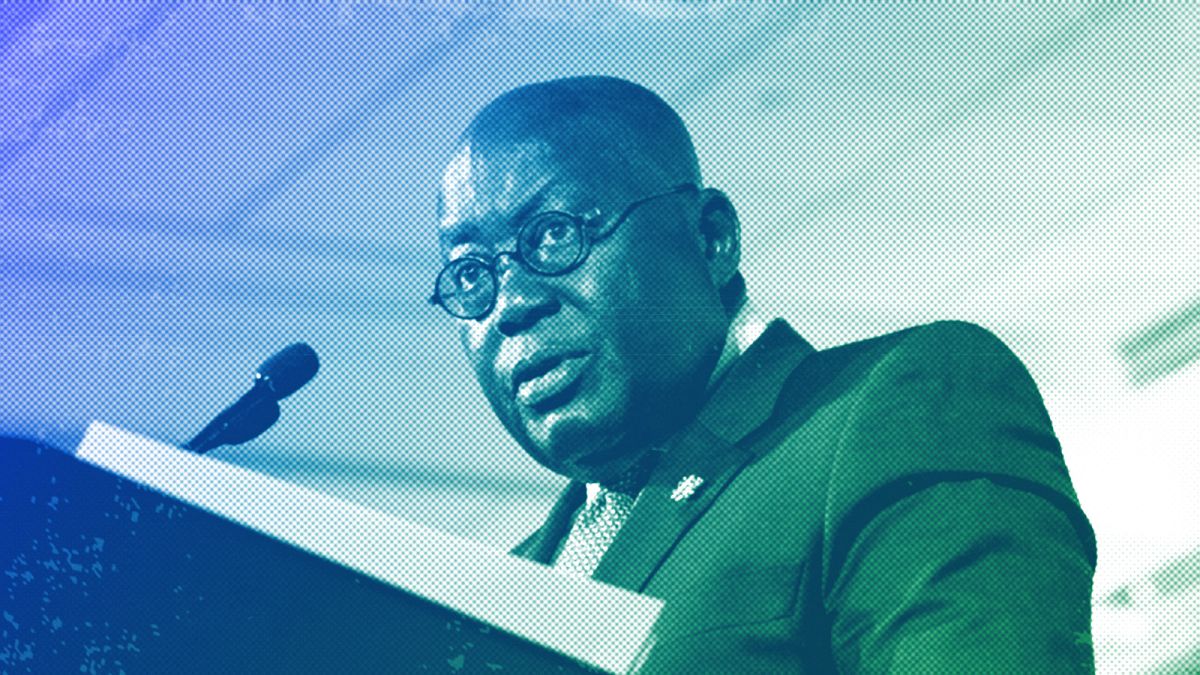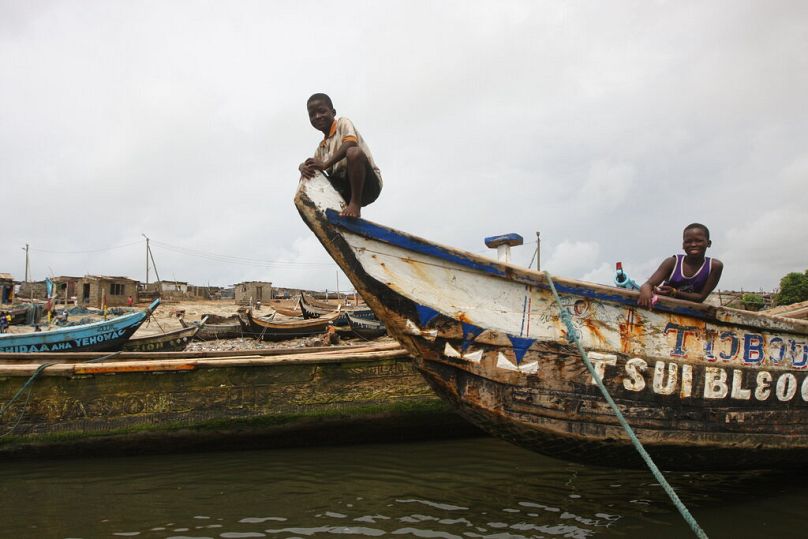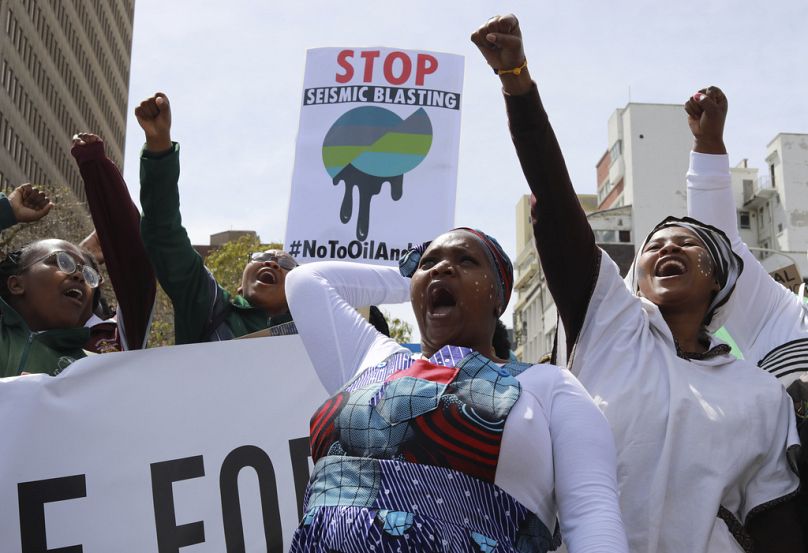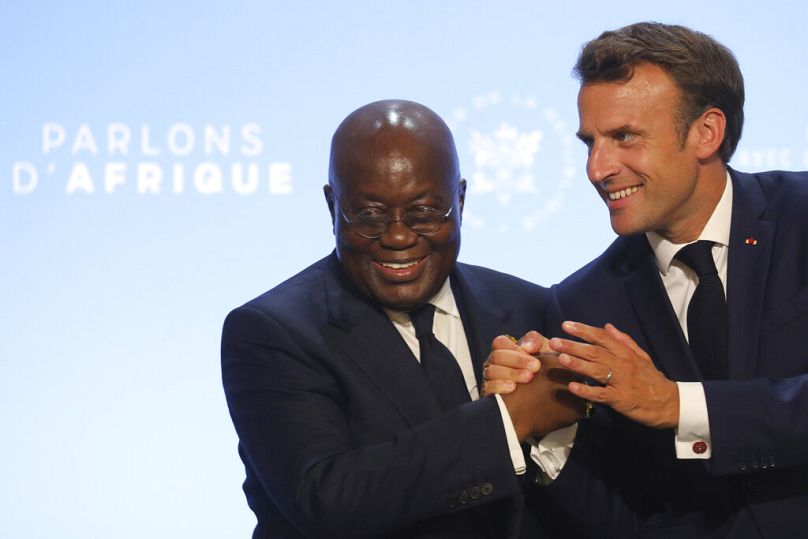Let us ensure that climate justice prevails, honouring our duty to the generations that will inherit the world we leave behind, Ghana President Nana Akufo-Addo writes in an exclusive op-ed for Euronews.
In the small fishing villages along the Ghanaian coast, generations have relied on the ocean for their livelihoods.
But as our planet heats up, the seas warming up and extreme weather combine to devastate their way of life.
A World Bank report found that climate change alone could reduce Ghana’s potential fish catch by 25% or more by 2050, threatening a way of life and key food source when much of Africa already scrambles to feed its people.
This is the Ghanaian experience — but it is a story repeated in developing countries across the world.
Another report, by Groundswell West Africa, found that up to 32 million people across the region — the equivalent of Ghana’s population — might be displaced by 2050.
The people who are the least to blame for climate change find themselves the first victims of an incoming disaster they did not cause.
Ghana, thankfully, has managed to keep developing rapidly. Our economy has grown at an average annual rate of around 6% over the past two decades - from a GDP of just below $5 billion (€4.74bn) 20 years ago to more than $77bn (€73bn) now.
We have invested in infrastructure, diversified our production base and modernized the country’s agricultural sector, which employs a large part of the population.
And we are working tirelessly to do our bit in the global fight against climate change.
'Fair share': A small phrase, yet deceptively simple
Ghana is a founding partner of the Climate and Clean Air Coalition (CCAC), and the first country in the world to include short-lived climate pollutants — such as methane and black carbon — into our Paris Agreement emissions reduction efforts.
We have committed to reducing our greenhouse gas (GHG) emissions and to accelerating climate adaptation in several priority sectors as a part of our effort to deliver the Paris Agreement.
But as drought, floods and heat waves continue to set new records across the world, we do not know how long we can keep up our efforts both to lift our population out of poverty and deliver nationally on global targets like the Sustainable Development Goals.
As we do our bit, we are asking those countries that have polluted the most, and that have the greatest means to take action, to do their fair share.
This small phrase, "fair share", is deceptively simple. But it is the core of any effort that would see the world join together to protect our shared home.
Those who polluted the most in the past need to do more now
The major economies, especially in the West, have spent the past century growing rich off the back of fossil-fuel-powered industrialisation.
As vulnerable nations, we are convinced it is only fair that those, who polluted the most in the past, must make a greater effort to tackle climate change, especially when they are also the richest and most capable to act.
Indeed, if those most responsible fail to own up to their fair share, it means we are counting on marginal polluters, the poor and vulnerable who are most impacted, to deliver the bulk of further efforts needed to avoid a planetary breakdown.
This would not only be fundamentally unjust, but also unrealistic: despite over one billion people calling our continent home, ultimately, all 54 of the African countries’ emissions amount to less than 4% of today’s global total.
Compare this with the G20’s 80% share. Or take the G7, who, with a smaller population than Africa, are responsible for close to half of all climate pollution since 1950.
An asymmetric relationship at the core of the issue
By asking countries to do their fair share, we are calling on them to set and deliver emission targets which take into account their past emissions, as well as their share of wealth and the global population.
Today, most major economies look only at their current pollution levels and assume every country will cut emissions at the same rate, regardless of how rich or populous they are.
To highlight this asymmetric relationship, the Climate Vulnerable Forum (CVF), which I chair, commissioned the Traffic Light Assessment.
It evaluates the 2030 Paris targets of every country on the same basis looking at their past pollution, wealth or development level, and share of the global population.
It awards a green light to nations who are doing their fair-share to stay within a 1.5 degrees Celsius world, an orange light for a 2 degrees Celsius world and a red light for anything beyond that.
Its findings show that the vast majority of the world’s nations — mainly developing countries — are already doing their fair share. This includes, on aggregate, Africa, the Least Developed Countries, the CVF and nearly all small island developing states.
The sense of distance is misleading
On the other hand, only a handful of developed countries, including the UK and Switzerland, come anywhere close to a fair share effort from among the rich.
Of the major emerging economies, India, home to one-fifth of the world’s population, pollutes below 2 tonnes of CO2 per person compared to the G7 average of 13.
Both the G7 and G20 have been given a red light, as most have climate targets that are nowhere near what would constitute them doing their fair share.
That has to change. With such an alarming gap between what is being done and what must be done, the red light is flashing, and it now falls on those most responsible and capable to step up and deliver.
The fate of fishing villages that could be underwater in a few decades' time, like Fuveme here in Ghana's Volta region, might feel distant to those shielded from these threats for now.
But that sense of safety is false — we share a common destiny, and it's our responsibility to shape it for the better. Let us ensure that climate justice prevails, honouring our duty to the generations that will inherit the world we leave behind.
Nana Akufo-Addo is the President of Ghana.
At Euronews, we believe all views matter. Contact us at view@euronews.com to send pitches or submissions and be part of the conversation.



